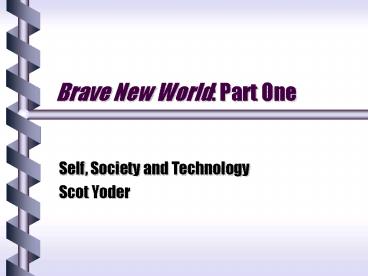Brave New World: Part One - PowerPoint PPT Presentation
1 / 23
Title:
Brave New World: Part One
Description:
Technology in the Brave New World. Looking ahead -- questions to consider ... Jacques Loeb -- parthenogenesis with frogs and sea urchins ... – PowerPoint PPT presentation
Number of Views:48
Avg rating:3.0/5.0
Title: Brave New World: Part One
1
Brave New World Part One
- Self, Society and Technology
- Scot Yoder
2
Overview
- The author
- The context of the novel
- social
- scientific
- Technology in the Brave New World
- Looking ahead -- questions to consider
3
The author -- Aldous Huxley
- Born July 26, 1894
- Grew up in the English intellectual elite
- grandson of T.H. Huxley
- brother of Julian Huxley
- At 16 an eye illness left him nearly blind
4
The author -- Aldous Huxley
- Lived in England, Europe, and the U.S.
- Wrote 47 books, many essays, screen-plays, etc
- Died November 22, 1963
5
Social context
- Social and political turmoil
- Novel was written in 1931, published in 1932,
after - The Bolshevik revolution (1917)
- World War I (1914-1918)
- The stock market crash (1929)
- Before the rise of totalitarianism
6
Social context
- Ford and mass production
- Production of Model T began in 1908
- Began using standard interchangeable parts and
assembly-line production in 1913 - More than 15 million sold by 1927
7
Scientific context
- Biology
- Psychology
8
Biology -- materialism
- Materialism in experimental biology and physiology
The problems of life are essentially the
problems of matter the phenomena of life are
investigated and can only be investigated, by the
same methods as all other phenomena of matter,
and the general results of such investigations
tend to show that living things are governed by
laws identical with those which govern inanimate
matter. Edward Schafer, 1912
9
Biology -- the creation of life
- Some biologists in the early 1900s sought to
create life in the laboratory - Jacques Loeb -- parthenogenesis with frogs and
sea urchins - Alexis Carrel -- the heart in a jar (tissue
culturing) - Edward Schafer -- the chemical creation of life
10
Edward Schafer -- life as per recipe
The elements composing the living substance are
few in number The combination of these elements
into a colloidial compound represents the
chemical basis of life, and when the chemist
succeeds in building up this compound it will
without doubt be found to exhibit the phenomena
which we are in a habit of associating with the
term life. Edward Schafer, 1912
11
Psychology -- classical conditioning
- Ivan P. Pavlov (1849-1936)
- A form of learning in which a reflexive or
automatic response transfers from one stimulus to
another.
12
Classical conditioning
13
Psychology -- behaviorism
- John B. Watson (1878-1958)
- Advocates the study of observable behavior
(responses) in relation to the environment
(stimuli). - Pays little attention to subjective, inner
experience. - Basis for behavior modification.
14
Technology in the Brave New World
- Control of reproduction
- ectogenesis
- eugenics (cloning)
- chemical conditioning
- Control of behavior
- classical conditioning
- hypnopaedia
- psychopharmacology -- soma
15
The role of technology
- Huxley comments on both the objects and the ends
of technology. - The objects -- humans
- The ends or goals -- social stability
- The World States motto Community, Identify,
Stability
16
The brave new world today?
- Control of reproduction
- Control of behavior
17
Reproductive control today
- Sex without kids
- birth control
- abortion
18
Reproductive control today
- Kids without sex
- assisted reproduction
- cloning
19
Reproductive control today
- Genetic prediction and manipulation -- the Human
Genome Project
20
Behavioral control today
- Public education
21
Behavioral control today
- Advertising and other forms of propaganda
22
Behavioral control today
- Psychopharmacology
- alcohol and other recreational drugs
- Prozac
- Ritalin
23
Looking ahead
- What is the relationship between technology and
progress? - What does it mean to be human?
- Does/should human nature place limits on what
kinds of technology we should pursue or how far
we should pursue it?































